Telstra and TPG Telecom’s planned network sharing arrangement has been blocked by Australia’s competition watchdog.
A flurry of late submissions from the telcos failed to convince the ACCC that the arrangement would be of benefit to customers, and would not create adverse impacts.
Telstra and TPG Telecom had proposed in February to share spectrum and cellular infrastructure in regional Australia, potentially for decades.
“We examined the proposed arrangements in considerable detail,” ACCC commissioner Liza Carver said.
"While there are some benefits, it is our view that the proposed arrangements will likely lead to less competition in the longer term and leave Australian mobile users worse off over time, in terms of price and regional coverage.”
Carver said that allowing Telstra and TPG to share spectrum and mobile infrastructure in regional Australia represented “a significant change to the structure of the market that would have long-term consequences.”
The commission said it would release its full reasons on Thursday this week, pending confidentiality checks.
It had been racing to meet a revised deadline for a decision this year, owing to large amounts of reports and data submitted by those for and against the proposed scheme.
A Telstra spokesperson said the telco planned to appeal the decision. It did not specify the forum in which it would lodge an appeal.
TPG said in an ASX filing that it would "carefully review" the decision and that it intended to file an application for review by the Australian Competition Tribunal.
Optus - which had largely led the campaign against the deal - welcomed the ACCC’s decision, calling it “a win for Australians”.
“From the outset we argued that this deal, which enabled TPG to quietly exit regional Australia, would entrench Telstra’s dominance, especially in the regions,” Optus vice president regulatory and public affairs Andrew Sheridan said.
Commpete - an alliance of telcos including Macquarie Telecom and Superloop - called the ACCC's decision "well-considered" and a "decisive move for competition, and the wholesale and retail mobile market at a national level."
“Had it been ushered through, the deal would have been another lever entrenching Telstra’s dominance in regional communications," chair Michelle Lim said in a statement.
'Extremely disappointing'
Both Telstra and TPG Telecom expressed disappointment in official statements.
Telstra CEO Vicki Brady called the decision "extremely disappointing, particularly considering the overwhelming support the proposal received from regional customers and community groups who participated in the consultation process."
“This decision is a massive missed opportunity for the people, businesses and communities of regional Australia," she said.
Brady thanked "all the people who recognised the benefits this agreement could bring and spoke up in favour of it."
"We will keep pushing for the right outcome for you," she said.
TPG Telecom's CEO Iñaki Berroeta used similar language in a statement of his own, expressing disappointment and arguing in favour of the deal's benefits.
The parties had hoped that several concessions provided throughout the ACCC's consideration - including an option to veto the deal after eight years - would sway the commission in approving it.
Throughout that consideration period, however, the ACCC publicly canvassed what it saw as alternative arrangements that TPG Telecom could pursue, other than a deal with Telstra.
One alternative used to cast doubt on the Telstra-TPG tie-up was whether TPG Telecom and Optus might agree to share some network assets.
Optus - seeking to have the Telstra-TPG deal blocked - called an agreement with TPG Telecom "a real commercial likelihood".
TPG Telecom called it "unlikely"; days later, it was revealed that a deal with Optus had previously been pursued, but that the parties could not agree to terms.



.jpg&h=140&w=231&c=1&s=0)






















